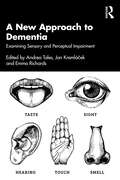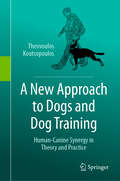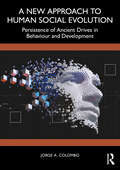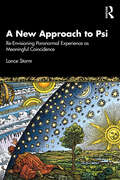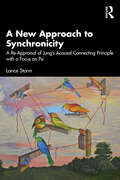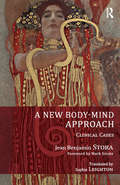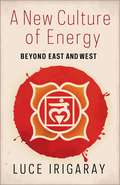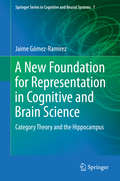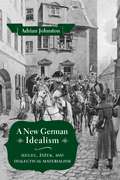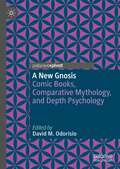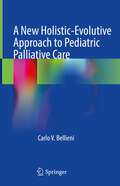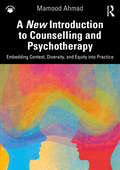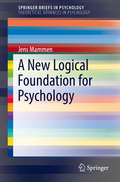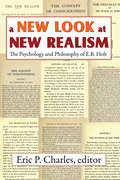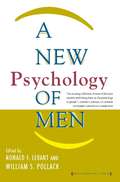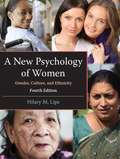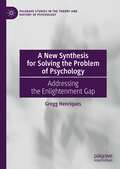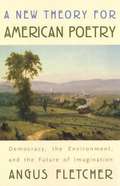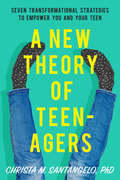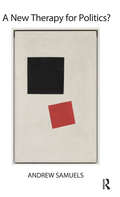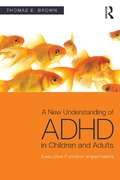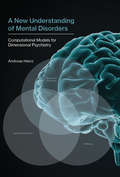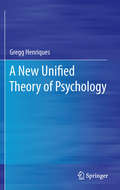- Table View
- List View
A New Approach to Dementia: Examining Sensory and Perceptual Impairment
by Emma Richards Andrea Tales Jan KremláčekA New Approach to Dementia: Examining Sensory and Perceptual Impairment is a groundbreaking work which highlights the non-memory impairments of the dementias to improve both early recognition of dementia and clinical diagnosis, as well as interventions and care. It focuses clinical attention on the significant evidence supporting the existence of many types of sensory and perception-related changes/abnormalities sometimes at the early stages of the disease and throughout its progression.Providing a holistic overview of the field, the book includes self-reports of people with dementia and caregivers, alongside an in-depth discussion of the application of the findings about non-memory impairments to clinical care and management. It leads a movement to address the over-focus on memory function in dementia and ageing, arguing for the need to test sensory and perceptual abnormalities to improve clinical practice and research into, and the care and support of, people living with dementia and associated disorders.With its mix of scientific, and clinical and real-life relevance, this book is essential for clinicians and researchers specialising in ageing and dementia as well as carers working with people living with dementia and students of neuropsychology/neurocognition, medicine and health and social care.
A New Approach to Dogs and Dog Training: Human-Canine Synergy in Theory and Practice
by Theovoulos KoutsopoulosThis book presents a new and innovative concept in dealing with dogs: the human-canine synergy (HCS), characterized by a holistic nature and its differentiation from unidimensional terms expressing the affiliation of humans and dogs (Relationship, Interaction, Bonding). Related to the use and training by humans, it applies three main categories of dogs: a) the empathy/therapeutic individuals, which are dogs helping persons with empathy- or therapeutic needs; b) assisting/working dogs carrying out specific actions to aid or assist humans perform specific tasks; and c) the facilitating/inspiring dogs, which enable or improve various human activities, including classroom dogs for teaching and learning purposes in almost all educational subjects.Organized in three parts, chapters address the following needs:• The first section illuminates the concept of HCS as well as basic principles determining this synergy and consequently the process of training dogs (owners and professional trainers). Readers will understand the role of a dog's personality, behavior and especially temperament in its successful training.• In a scientifically documented way, the second part guides those who wish to engage in dog training (amateur or professional). It describes basic training forms within the HCS framework (obedience, protection, detection and classroom dog) and necessary steps for proper completion.• The third book part describes the business of dog training with multi-dimensional approach by emphasizing a good understanding and knowledge of interactions and the environment in which trainer, owner and dog typically operate.Overall, this work is a valuable read for anyone who deals with our four-legged companions for business or pleasure.
A New Approach to Human Social Evolution: Persistence of Ancient Drives in Behaviour and Development
by Jorge A. ColomboThis book provides an important examination into the role of evolution of human traits of dominance as central to understanding social and political events, proposing a new view on human social evolution. It also examines basic biological universal needs and behavioural profiles of non- human living beings, from which humans share essential survival components. It invites readers to think critically about the psychological evolution of the human brain. Using comparative psychology, it argues that the core of human behaviour lies in the ancient, animal, universal set of survival resources hidden under various socialization profiles. However, it generally fails to replace drives of dominance and aggression for physical and social survival. Genuine replacement of those primal behavioural drives would require fundamental neuro- socio- behavioural changes. This book supports the thesis that without education and the promotion of universal values involving environmental protection and individual opportunities to evolve, there will be negative consequences for individuals and communities. This book represents a critical tool for students of behavioural sciences, anthropology, politics, and evolutionary neurosciences, and will also greatly benefit other readers, such as teachers and professional researchers.
A New Approach to Psi: Re-Envisioning Paranormal Experience as Meaningful Coincidence
by Lance StormThis book critiques conventional parapsychological viewpoints about extrasensory perception (ESP) and psychokinesis (PK), collectively referred to as ’psi’.Since the 1930s, an over-arching view on psi has been built on J. B. Rhine’s research and theories at Duke University. The author argues that there are fundamental problems with the psi paradigm, and offers solutions based largely on Jung’s Theory of Synchronicity, treating the subject matter in a rigorous scientific way. The synchronicity concept speaks to ambiguous psi terminology, the narrow methodological approaches in psi testing, and limited interpretations of psychic experience that do not consider the pivotal role of meaning. This book considers problems with terminology, findings, and the psi construct from a Jungian synchronistic standpoint, which gives credence to issues such as archetypes, meaningfulness, and numinosity.An important new contribution to the understanding of psi, this book will be of interest to practitioners and researchers working in the disciplines of psychology, parapsychology, consciousness studies, and physics, especially quantum mechanics.
A New Approach to Synchronicity: A Re-Appraisal of Jung’s Acausal Connecting Principle with a Focus on Psi
by Lance StormThis book offers an up-to-date handling of C. G. Jung’s Theory of Synchronicity and the more mainstream paranormal phenomena known as extra-sensory perception (ESP) and psychokinesis (PK), collectively referred to as ‘psi’.Author Lance Storm re-works various aspects of synchronicity, traditionally marginalized by parapsychologists, to bring about a paradigm shift in the field. Most often seen as fundamentally different, the book draws parallels between psi and synchronicity and equates the two, arguing that psi was all along a form of synchronicity – just as Jung had anticipated. To achieve this, Storm necessarily modifies both the parapsychologist’s view about psi, and Jung’s views about synchronicity, enabling a satisfactory merger of the two paranormal phenomena.Based on rigorous scientific research and written in an easy-to-understand style, this book is an important resource for specialists such as anomalistic psychologists, parapsychologists, philosophers, paranormalists and theologians.
A New Body-Mind Approach: Clinical Cases
by Jean Benjamin StoraIntegrative psychosomatics is a new approach to explaining illnesses and how patients relate to their problems. This new discipline draws on psychoanalysis, medicine and the neurosciences, rather than solely on psychoanalysis, which has inspired all the psychosomatic approaches until now. Amongst the fascinating and compelling questions that this book raises are: how can we understand an illness if we only analyse the psyche? How can we understand patients if we only take account of their biological data? Are hypochondriac problems generated by the mind, as some doctors believe, or are the problems in fact more complex? The author also considers whether traditional psychoanalysis and medicine might actually distance practitioners from an understanding of patients and illnesses. For integrative psychosomatics, the psyche or the mind can play either a greater or lesser role in illness: advances in research in the neurosciences and biology over the last twenty years have uncovered many biological and genetic processes involved in the relations between the central nervous system and the other systems that constitute the human psychosomatic entity.
A New Culture of Energy: Beyond East and West
by Luce IrigarayIn A New Culture of Energy, Luce Irigaray reflects on three critical concerns of our time: the cultivation of energy in its many forms, the integration of Asian and Western traditions, and the reenvisioning of religious figures for the contemporary world. A philosopher as well as a psychoanalyst, Irigaray draws deeply on her personal experience in addressing these questions. In her view, although psychoanalysis can succeed in releasing mental energy, it fails to support physical and spiritual well-being. In pursuit of an alternative, she took up the bodily practices of yoga and pranayama breathing, which she considers in light of her analysis of sexuate belonging and difference. Reflecting on these practices, Irigaray contrasts yoga’s approach to the natural world with how the Western tradition privileges mastery over nature. These varied sources provoke her to question how a tradition imagines transcendence and the divine. In the book’s final section, she reinterprets the figure of Mary through breath, self-affection, and touch, recalibrating her physicality within a natural world. A reflection on the liberation of human energy, this book urges us to cultivate an evolutionary culture in harmony with all living beings.
A New Foundation for Representation in Cognitive and Brain Science: Category Theory and the Hippocampus (Springer Series in Cognitive and Neural Systems #7)
by Jaime Gómez-RamirezThe purpose of the book is to advance in the understanding of brain function by defining a general framework for representation based on category theory. The idea is to bring this mathematical formalism into the domain of neural representation of physical spaces, setting the basis for a theory of mental representation, able to relate empirical findings, uniting them into a sound theoretical corpus. The innovative approach presented in the book provides a horizon of interdisciplinary collaboration that aims to set up a common agenda that synthesizes mathematical formalization and empirical procedures in a systemic way. Category theory has been successfully applied to qualitative analysis, mainly in theoretical computer science to deal with programming language semantics. Nevertheless, the potential of category theoretic tools for quantitative analysis of networks has not been tackled so far. Statistical methods to investigate graph structure typically rely on network parameters. Category theory can be seen as an abstraction of graph theory. Thus, new categorical properties can be added into network analysis and graph theoretic constructs can be accordingly extended in more fundamental basis. By generalizing networks using category theory we can address questions and elaborate answers in a more fundamental way without waiving graph theoretic tools. The vital issue is to establish a new framework for quantitative analysis of networks using the theory of categories, in which computational neuroscientists and network theorists may tackle in more efficient ways the dynamics of brain cognitive networks. The intended audience of the book is researchers who wish to explore the validity of mathematical principles in the understanding of cognitive systems. All the actors in cognitive science: philosophers, engineers, neurobiologists, cognitive psychologists, computer scientists etc. are akin to discover along its pages new unforeseen connections through the development of concepts and formal theories described in the book. Practitioners of both pure and applied mathematics e. g. , network theorists, will be delighted with the mapping of abstract mathematical concepts in the terra incognita of cognition.
A New Freudian Synthesis: Clinical Process in the Next Generation (CIPS (Confederation of Independent Psychoanalytic Societies) Boundaries of Psychoanalysis)
by Norbert Freedman Andrew B. Druck Carolyn Ellman Aaron ThalerThis work presents a vision of contemporary Freudian psychoanalysis. The contributors show how modern Freudian analysts have translated and retranslated the contributions of analysts on whose shoulders they stand, including Freud, Winnicott, Loewald, Ferenczi and others, and synthesized them into a new conception of Freudian theory and technique.The opening chapters provide a theoretical overview, demonstrating the evolution of Freudian theory and ways in which different theories can be integrated. The latter chapters, forming the bulk of the volume, translate that frame into clinical process.Analysts confronted with clinical dilemmas - for example, patients who cannot, for various reasons, use interpretations productively - find ways to address these dilemmas while deepening the analytic process. The reader will find that a new synthesis has taken place in which the relationship with the analyst is a crucial element in setting the stage for patients to take a closer look into their inner world.
A New German Idealism: Hegel, Žižek, and Dialectical Materialism
by Adrian JohnstonIn 2012, philosopher and public intellectual Slavoj Žižek published what arguably is his magnum opus, the one-thousand-page tome Less Than Nothing: Hegel and the Shadow of Dialectical Materialism. A sizable sequel appeared in 2014, Absolute Recoil: Towards a New Foundation of Dialectical Materialism. In these two books, Žižek returns to the German idealist G. W. F. Hegel in order to forge a new materialism for the twenty-first century. Žižek’s reinvention of Hegelian dialectics explores perennial and contemporary concerns: humanity’s relations with nature, the place of human freedom, the limits of rationality, the roles of spirituality and religion, and the prospects for radical sociopolitical change.In A New German Idealism, Adrian Johnston offers a first-of-its-kind sustained critical response to Less Than Nothing and Absolute Recoil. Johnston, a leading authority on and interlocutor of Žižek, assesses the recent return to Hegel against the backdrop of Kantian and post-Kantian German idealism. He also presents alternate reconstructions of Hegel’s positions that differ in important respects from Žižek’s version of dialectical materialism. In particular, Johnston criticizes Žižek’s deviations from the secular naturalism and Enlightenment optimism of his chosen sources of inspiration: not only Hegel, but Karl Marx and Sigmund Freud too. In response, Johnston develops what he calls transcendental materialism, an antireductive and leftist materialism capable of preserving and advancing the core legacies of the Hegelian, Marxian, and Freudian traditions central to Žižek.
A New Gnosis: Comic Books, Comparative Mythology, and Depth Psychology (Contemporary Religion and Popular Culture)
by David M. OdorisioSuperhero phenomena exploded into 20th- and 21st-century popular culture by way of the visual medium of comic books. In an increasingly secular (yet spiritual) culture that has largely renounced “the gods” (and even religion), what does the return of the superhero through our own pop cultural mythologies say to us—or even about us? This collection of essays from leading and up-and-coming scholars in the fields of comparative mythology and depth psychology considers the return of the superhero as representative of our own unique emergent modern mythology: a wildly diverse pantheon that reflects back to us our most far-reaching hopes and (im)possible (super)human desires. In placing the interpretive tools of comparative mythology and depth psychology alongside the comic book phenomenon, a super-powered palette emerges that unveils the hidden potential of modern readers’ own heightened imaginations. The essays in this anthology examine select comic book and superhero characters from the “Silver Age” 1960s through contemporary 21st-century adaptations and innovations, as readers are invited to discover and uncover what the (re)emergence of these perennial gods and goddesses have to say about our own secret super selves today.
A New Holistic-Evolutive Approach to Pediatric Palliative Care
by Carlo V. BellieniThis book illustrates why a holistic approach is important in Pediatric Palliative Care (PPC). Readers will learn this approach has a “horizontal” axis, featuring the patients’ mental and physical needs, as well as their environments. It has also a “vertical axis”: the evolutive changes of the patients throughout their development and their illness, their aspirations and fears. An evolutive (or dynamic) approach is mandatory. Each child/parent has a different experience of illness and a different path to recovery that is influenced by their age, gender, culture, but also by the state of their grief. To take care of them, we need to know the state of the subjects we are dealing with throughout their evolution in age (children) and in sorrow (both children and parents). Jung’s and Piaget’ schemes will be of support. This book also helps caregivers to know what ethics is. It teaches a new insight on the word “ethics”: not a series of principles or norms, but an approach based on humanistic virtues. Two criteria will be proposed to this aim: an ethics based on the refusal of inauthentic behaviors (or those behaviors that are copies of animals or machines) and a new criterion that even children have some ethical duties (not based on rules, but on naturally acceptance that their sight is modulated by the presence of their parents and friends). This ethical approach is explained to caregivers in a practical mode, ready for clinical exigencies. This book is also unique because it demonstrates that PPC also involves the true care of caregivers. It will explain how to approach, measure and overcome caregivers’ burn-out. Special attention is devoted to the approach to babies’ and children’s pharmacological and non-pharmacological analgesia and sedation. Pain assessment methods will be illustrated, as well as the development of a PPC web on the territory. This text includes perinatal and neonatal PPC. The book will be of valuable support to all those intensivists, pediatricians, nurses, psychologists, physiotherapists and healthcare professionals working in PPC units.
A New Introduction to Counselling and Psychotherapy: Embedding Context, Diversity, and Equity into Practice
by Mamood AhmadThis groundbreaking, comprehensive, and practical textbook offers a mainstream introduction to self-development, theory, skills, and practice in counselling and psychotherapy.Mamood Ahmad systematically embeds the implications of the "client in context" through an evolving framework called whole-person practice, woven into every aspect of mainstream knowledge and practice to address gaps. This includes essential, yet often overlooked, dimensions such as social context, culture, identity, diversity, neurodiversity, embodiment, knowledge, worldviews, power dynamics, intersectionality, and trauma- and harm-informed approaches. As a result, the book strengthens the very foundations of therapy for all and ensures that equity, diversity, and inclusion (EDI/DEI) are embedded by design from the outset rather than treated as add-ons. Each chapter is structured as a practical learning resource and lesson plan, modelling an embedded course curriculum and featuring case studies, discussion prompts, and reflection exercises to enhance critical thinking and real-world application to practise. Learning is further enriched by contributions from therapists with lived experience and specialised knowledge, as well as access to online resources and additional training opportunities.Unlocking the future of a stronger, sustainable, and more equitable therapeutic profession, this book will be an essential part of psychotherapy and counselling curricula for students, course tutors, therapists, supervisors, and other helping professionals.
A New Logical Foundation for Psychology (SpringerBriefs in Psychology)
by Jens MammenThis SpringerBrief provides an interdisciplinary synthesis based on psychology, logic, mathematics, cognitive science, and the history of science. It presents psychology as a science that suffers from a reduced understanding of the most fundamental logic in our practical-bodily encounters with the world, including with our fellow human beings. The Brief offers a new "dual" logic that is based on the duality between identification and description of objects, including persons. The Brief ties in modern mathematics as a tool that can be used to catch this duality in a precise manner. Featured topics in this Brief include: The emergence of Mechanism. The duality in animal and human subject-object relations. Psychology's compatibility with natural sciences. Four cornerstones of modern mathematics. The Extensional Method. A New Logical Foundation for Psychology will be of interest to psychologist, philosophers, and mathematicians concerned with basic theoretical and methodological problems.
A New Look at New Realism: The Psychology and Philosophy of E. B. Holt
by Eric CharlesThis volume brings to the attention of contemporary readers a tradition of psychological thought that has received little attention over the last century. Psychology's history has been unimaginatively presented as a fight between behaviorists and mentalists. A third alternative, the New Realism, which cuts through that dichotomy, has been lost. "The New Realism" was indeed once new. This volume provides a glimpse of how this school of thought attempted to redefine the notion of mental processes, including consciousness, in psychological theorizing. Holt's rejected the nativity of iconoclastic Watsonian behaviorists, and thus the New Realism was thoughtful in ways that behaviorist social engineering was not. The implications of these innovations in psychological theorizing are traced from the beginning of the twentieth century to the contemporary period. The contributors provide these intellectual links, along with efforts to look at the relatedness of the human organism and its world. At their beginning, these ideas are embedded in a reverence for William James's work, particularly his later Radical Empiricism. In contemporary psychology, this legacy has given us the framework of ecological psychology as we know it today, and provides the basis for several modern critiques of cognitive psychology. The present volume opens the door for future historical inquiries. This is an exemplary addition to the series on the History of Psychological Ideas.
A New Psychology Of Men
by Ronald F. Levant William S. PollackInspired by feminist scholars who revolutionized our understanding of women's gender roles, the contributors to this pioneering book describe how men's proscribed roles are neither biological nor social givens, but rather psychological and social constructions. Questioning the traditional norms of the male role (such as the emphasis on aggression, competition, status, and emotional stoicism), they show how some male problems (such as violence, homophobia, devaluation of women, detached fathering, and neglect of health needs) are unfortunate by-products of the current process by which males are socialized. By synthesizing the latest research, clinical experience, and major theoretical perspectives on men and by figuring in cultural, class, and sexual orientation differences, the authors brilliantly illuminate the many variations of male behavior. This book will be a valuable resource not just for students of gender psychology in any discipline but also for clinicians and researchers who need to account for the relationship between men's behavior and the contradictory and inconsistent gender roles imposed on men. This new understanding of men's psychology is sure to enhance the work of clinical professionals-including psychologists, psychiatrists, social workers, counselors, and psychiatric nurses-in helping men reconstruct a sense of masculinity along healthier and more socially just lines.
A New Psychology Of Women: Gender, Culture, And Ethnicity (Fourth Edition)
by Hilary M. LipsRich, original, and transformative, the latest edition of A New Psychology of Women examines how gender-related expectations interact with other cultural assumptions and stereotypes, and with social and economic conditions, to affect women's experiences and behavior. Absorbing narratives centered on essential topics in psychology and global research engage readers to grasp cutting-edge insights into the psychological diversity of women. Aware that our own cultural experience colors and limits what we think we know about people, veteran educator and scholar Hilary Lips imbues her discussions with international examples and perspectives to provide an inclusive approach to the psychology of women.
A New Republic of Letters
by Jerome McgannA manifesto for the humanities in the digital age, A New Republic of Letters argues that the history of texts, together with the methods by which they are preserved and made available for interpretation, are the overriding subjects of humanist study in the twenty-first century. Theory and philosophy, which have grounded the humanities for decades, no longer suffice as an intellectual framework. Jerome McGann proposes we look instead to philology--a discipline which has been out of fashion for many decades but which models the concerns of digital humanities with surprising fidelity. For centuries, books have been the best way to preserve and transmit knowledge. But as libraries and museums digitize their archives and readers abandon paperbacks for tablet computers, digital media are replacing books as the repository of cultural memory. While both the mission of the humanities and its traditional modes of scholarship and critical study are the same, the digital environment is driving disciplines to work with new tools that require major, and often very difficult, institutional changes. Now more than ever, scholars need to recover the theory and method of philological investigation if the humanities are to meet their perennial commitments. Textual and editorial scholarship, often marginalized as a narrowly technical domain, should be made a priority of humanists' attention.
A New Synthesis for Solving the Problem of Psychology: Addressing the Enlightenment Gap (Palgrave Studies in the Theory and History of Psychology)
by Gregg HenriquesIn this incisive analysis of academic psychology, Gregg Henriques examines the fragmented nature of the discipline and explains why the field has had enormous difficulty specifying its subject matter and how this has limited its ability to advance our knowledge of the human condition. He traces the origins of the problem of psychology to a deep and profound gap in our knowledge systems that emerged in the context of the scientific Enlightenment.To address this problem, this book introduces a new vision for scientific psychology called mental behaviorism. The approach is anchored to a comprehensive metapsychological framework that integrates insights from physics and cosmic evolution, neuroscience, the cognitive and behavioral sciences, developmental and complex adaptive systems theory, attachment theory, phenomenology, and social constructionist perspectives and is well grounded in the philosophy of science. Building on more than twenty years of work in theoretical psychology and drawing on a wide range of literature, Professor Henriques shows how this new approach to scientific knowledge fills in the gaps of our current understanding of psychology and can allow us to develop a more holistic and sophisticated way to understand animal and human mental behavioral patterns. This work will especially appeal to students and scholars of general psychology and theoretical psychology, as well as to historians and philosophers of science.
A New Theory for American Poetry: Democracy, the Environment, and the Future of Imagination
by Angus FletcherAmid gloomy forecasts of the decline of the humanities and the death of poetry, Angus Fletcher, a wise and dedicated literary voice, sounds a note of powerful, tempered optimism. He lays out a fresh approach to American poetry at large, the first in several decades, expounding a defense of the art that will resonate well into the new century. Breaking with the tired habit of treating American poets as the happy or rebellious children of European romanticism, Fletcher uncovers a distinct lineage for American poetry. His point of departure is the fascinating English writer, John Clare; he then centers on the radically American vision expressed by Emerson and Walt Whitman. With Whitman this book insists that "the whole theory and nature of poetry" needs inspiration from science if it is to achieve a truly democratic vista. Drawing variously on Complexity Theory and on fundamentals of art and grammar, Fletcher argues that our finest poetry is nature-based, environmentally shaped, and descriptive in aim, enabling poets like John Ashbery and other contemporaries to discover a mysterious pragmatism. Intense, resonant, and deeply literary, this account of an American poetics shows how today's consumerist and conformist culture subverts the imagination of a free people. While centering on American vision, the argument extends our horizon, striking a blow against all economically sanctioned attacks upon the finer, stronger human capacities. Poetry, the author maintains, is central to any coherent vision of life.
A New Theory of Teenagers: Seven Transformational Strategies to Empower You and Your Teen
by Christa SantangeloA guide for families to thrive in the midst of the tumultuous teen years--and the culmination of the author's twenty-five years of experience in both conventional psychology and alternative methodsIn her decades of practice and academic research, Dr. Christa Santangelo, a psychologist and assistant clinical professor at the University of California-San Francisco, has seen many relationships devastated by the emotional hurricane that teenagers can inflict on a family. Yet Dr. Santangelo also understands how that conflict can be resolved and a new way forward mapped together between parents and teen. In A New Theory of Teenagers, she gives parents the advice, tips, support, and big-picture overview needed to see the teen years as an opportunities for growth and positive relationship changes. With counterintuitive steps (such as "Endure Emotions"), she offers hope and empowerment. Dr. Santangelo asserts that parents have a far greater impact on conflict with their teen than they may realize, metaphorically handing parents back the power to shift the situation to harmony. And, Dr. Santangelo does it with a fresh and multi-dimensional approach to the parent-teen relationship by integrating conventional psychology with alternative methods including yoga and meditation-intended to work on building trust, sitting with and understanding emotions, and seeing room for positivity in the midst of it all.
A New Therapy for Politics?
by Andrew SamuelsAndrew Samuels has established an international practice as a political consultant, working with senior politicians, political parties and activist groups. His lectures and workshops on the application of 'therapy thinking' to social and political issues attract wide interest. His previous books in this area, such as The Political Psyche and Politics on the Couch, have been widely appreciated. Now, in a long-anticipated tour-de-force that is both compassionate and intellectually stimulating, this book deepens in a new and innovate style his engagement with themes such as economics, ecopsychology, leadership, aggression and violence, the role of the individual in progressive politics, and sexuality and spirituality in political contexts. The reader is encouraged to move beyond conventional professional or academic discourse by the inclusion of experiential exercises in the text. In this way, activism and analysis, public and private, therapeutic and more-than-personal are all brought together in a satisfying yet challenging synthesis.
A New Understanding of ADHD in Children and Adults: Executive Function Impairments
by Thomas E. BrownFor over 100 years, ADHD has been seen as essentially a behavior disorder. Recent scientific research has developed a new paradigm which recognizes ADHD as a developmental disorder of the cognitive management system of the brain, its executive functions. This cutting-edge book pulls together key ideas of this new understanding of ADHD, explaining them and describing in understandable language scientific research that supports this new model. It addresses questions like: - Why can those with ADHD focus very well on some tasks while having great difficulty in focusing on other tasks they recognize as important? - How does brain development and functioning of persons with ADHD differ from others? - How do impairments of ADHD change from childhood through adolescence and in adulthood? - What treatments help to improve ADHD impairments? How do they work? Are they safe? - Why do those with ADHD have additional emotional, cognitive, and learning disorders more often than most others? - What commonly-held assumptions about ADHD have now been proven wrong by scientific research? Psychiatrists, psychologists, social workers, and other medical and mental health professionals, as well as those affected by ADHD and their families, will find this to be am insightful and invaluable resource.
A New Understanding of Mental Disorders: Computational Models for Dimensional Psychiatry
by Andreas HeinzA new computational and dimensional approach to understanding and classifying mental disorders: modeling key learning and decision-making mechanisms across different mental disorders. Even as researchers look for neurobiological correlates of mental disorders, many of these disorders are still classified solely according to the manifestation of clinical symptoms. Neurobiological findings rarely help diagnose a specific disease or predict its outcome. Although current diagnostic categories are questionable (sometimes labeling common states of human suffering as disorders), traditional neuroimaging approaches are not sophisticated enough to capture the neurobiological markers of mental disorder. In this book, Andreas Heinz proposes a computational and dimensional approach to understanding and classifying mental disorders: modeling key learning and decision-making mechanisms across different mental disorders. Such an approach focuses on the malleability and diversity of human behavior and its biological underpinnings. Heinz explains basic learning mechanisms and their effects on human behavior, focusing not on single disorders but on how such mechanisms work in a multitude of mental states. For example, he traces alterations in dopamine-reinforcement learning in psychotic, affective, and addictive disorders. He investigates to what extent these basic dimensions of mental disorders can account for such syndromes as craving and loss of control in addiction, positive and negative mood states in affective disorders, and the altered experience of self and world associated with psychotic states. Finally, Heinz explores the clinical and therapeutic implications of such accounts. He argues that a focus on learning mechanisms, with its emphasis on human creativity and resilience, should help reduce the stigma of mental disorder.
A New Unified Theory of Psychology
by Gregg HenriquesConcern about psychology's fragmentation is not new, but there has for the past decade been increasing calls for psychologists to acknowledge to the costs associated with fragmentation and to search for ways to unify the discipline. A New Unified Theory of Psychology introduces a new system that addresses psychology's current theoretical and philosophical difficulties. The new theory consists of four interlocking pieces that together provide--for the first time--a macro-level view that clarifies the nature of psychology's problems and offers a clear way to unify the various elements of the field. The unified theory provides the field of psychology with a well-defined subject matter, allowing both academic and professional psychologists will be able to develop a shared language and conceptual foundation.
